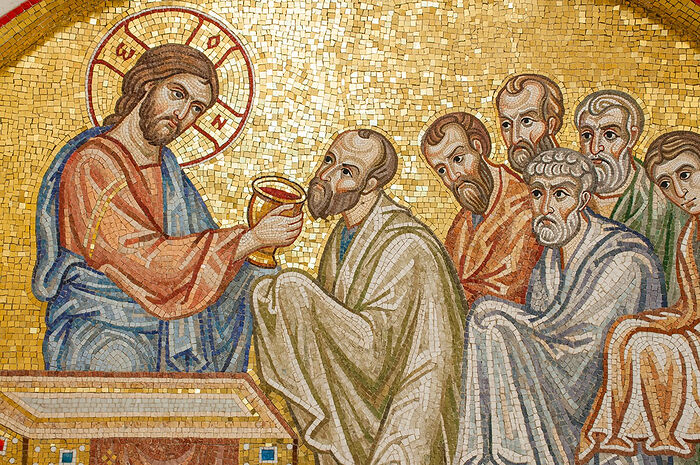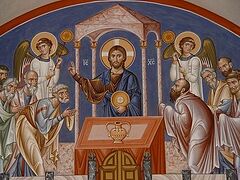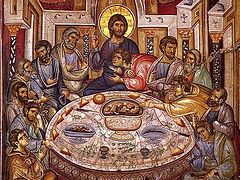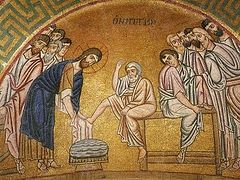In the Name of the Father, and of the Son, and of the Holy Spirit!
Dear brothers and sisters, today we remember the Last Supper of the Lord and the prayer about the Cup in the Garden of Gethsemane. The Supper is truly mysterious, containing mysteries that are incomprehensible to the human mind. This is an hard saying (Jn. 6:60), the unbelieving Jews said when they heard Christ’s preliminary word, filled with Old Testament images, about what Christ has actually done today.
The essence of what happened there is the conclusion of a new covenant of God with the people, sealed with, instead of the written word, the Blood of Christ. The Old Testament law in itself could not correct and purify the paths of life—it made it possible to approach God by paths of external righteousness, while the hearts of people, carried away by their lusts, remained uncleansed and far from God.
Everything that the law could not fulfill, Christ—the end of the law—corrected (cf. Rom. 10:4). Wishing to bring people into a new covenant with God, He first of all washes His disciples’ feet in order to wash away the impurity of the former ways of life, distorted by disobedience (cf. Jn. 13:10). Since Adam’s main temptation was the proud thought: Ye shall be as gods (Gen. 3:5), the Lord Jesus Christ, first of all, shows the image of perfect humility. He, in Whose hand is the breath of all living creatures, bows down at the feet of His creation to wash them. The One Who, being in the form of God, thought it not robbery to be equal with God…, took upon Him the form of a servant (Phil. 2:6-7), serving those who are subject to Him. Along with their feet, isn’t this also the washing of men’s hearts? For what heart will not be touched at the sight of such a humble Lord of all creation, pouring out streams of tears that wash the impurity of the heart?
If I then, your Lord and Master, have washed your feet; ye also ought to wash one another’s feet. For I have given you an example, that ye should do as I have done to you (Jn. 13:14-15). Don’t deviate from humility and love for your neighbor, even if it seems to be the most humiliating service. Whoever humbles himself not only before God the Almighty, but also before his neighbor (who may seem contemptible and despicable)—won’t he break the horns of pride in himself? And won’t he take away from himself the main obstacle to walking in Divine ways? Thus by washing the disciples’ feet, Christ corrected the disobedience of Adam, which made all the ways of his life unclean. But that was not enough; that was only the beginning.
The Old Testament, showing man the Divine ways, did not give him the strength to follow them—it only prepared him to walk in the ways of the New Testament. What prevented man from walking the Divine path? Love of self. It made man hard-hearted, stiff-necked and disobedient from his mother’s womb, preventing any significant renewal of the ways of life and of the heart—the source of life—whence all the ways of life come.
In order to correct this distortion of the paths of life, which stems from love of self, Christ offers Himself as a sacrifice, shedding His own Blood in place of the blood of sacrificial animals, cutting off completely in His Person the self-love of mankind with whom He is united. He leads people, in the person of the apostles, into a new covenant with God, sealed by His Blood. What could be stronger than this covenant? For sealing a covenant with His Blood is a work of perfect love that sacrifices itself, and only by such sacrifice can love of self, which destroys the covenant, be cut off at the root. Love alone is capable of sacrificing itself. It is truly strong as death (Song 8:6), and no power in the world can break its bonds. With His own Blood Christ writes the words of the New Testament, living words of love, not on tablets of stone, but of the heart—where is the very source of love and life itself. Therefore, the renewal of life in Christ is not imaginary and external, but real and essential (cf. 2 Cor. 3:3; 5:16-17). Only these living words of love are indelible forever. He showed in practice that having loved His own which were in the world, He loved them unto the end (Jn. 13:1).
After the Last Supper Christ’s soul was exceeding sorrowful, even unto death (Mt. 26:38). He prayed earnestly: and His sweat was as it were great drops of blood falling down to the ground (Lk. 22:44). This is the greatest tension of the spirit, driven by love for mankind—disobedient and hardened in heart. Only through sorrows and prayers of a one who loves will a hardened heart become contrite. It is not God Who is inexorable, but disobedient man who will not heed any calls of Divine love. It is not God who is hart-hearted (as if refusing to listen to His Son’s prayer about the Cup), but because of the extreme hart-heartedness and stiff-neckedness of man the Son of Man cannot avoid the Cup of external suffering. So when it was revealed to Christ during His prayer in the Garden of Gethsemane that it was impossible to bring people into obedience to God with only internal suffering and prayers of love, this love prompts Him to decide voluntarily upon external suffering: Sacrifice and offering Thou wouldest not, but a body hast Thou prepared Me... Lo, I come (in the volume of the book it is written of Me,) to do Thy will, O God (Heb. 10:5–7).
Brothers and sisters, let us penetrate into the mysteries of love revealed by Christ at this Supper. Let us imprint in our minds and hearts Christ’s words and deeds, which breathe inexpressible love. Let us not leave the banquet of Christ hungry, but let us be filled with the gifts of His love. Let us carry His covenants from church into life; let us become co-partakers of the apostles of Christ, and not of the fallen traitor Judas.
And Christ will fill us who keep His covenants with His joy even during this earthly life, and will lead us into His greater blessedness in eternal life. Amen.
From: Archimandrite Ilya (Reyzmir). Sermons. Second revised edition (Sergiev Posad: The Publishing House of the Holy Trinity-St. Sergius Lavra, 2016).




